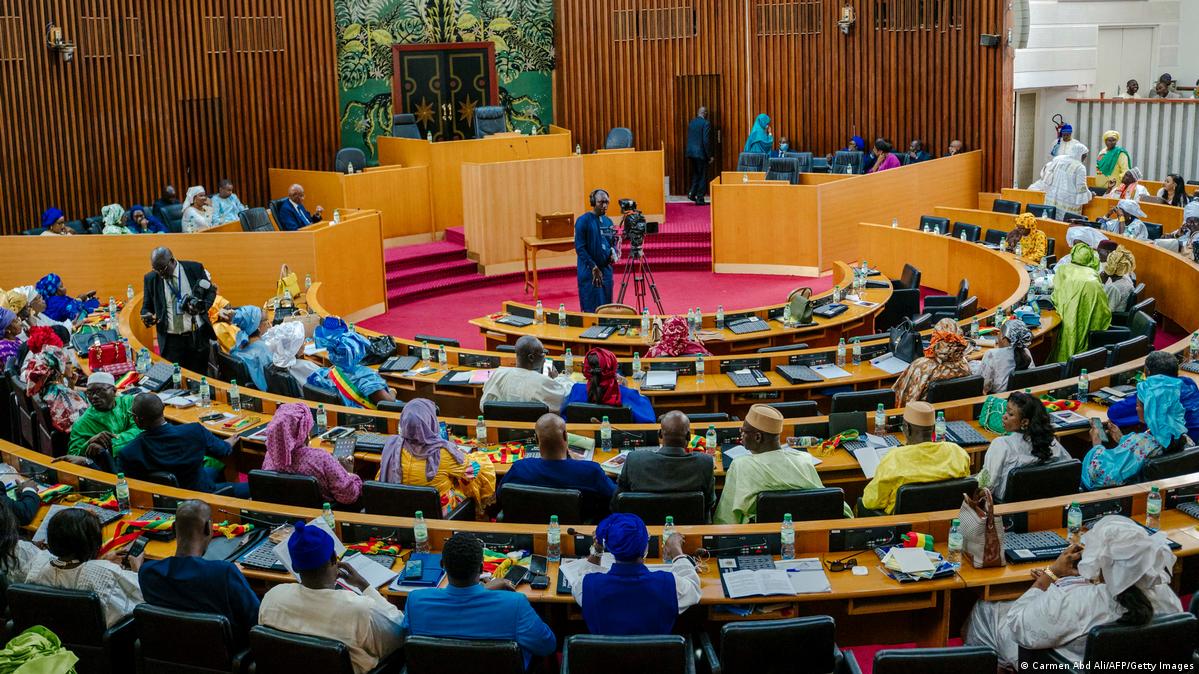Gambiaj.com – (DAKAR, Senegal) – The Senegalese National Assembly is the ongoing scene of fiery exchanges on Tuesday as lawmakers debated Bill No. 05/2025, an interpretative law seeking to clarify the scope of the 2024 amnesty law introduced under former President Macky Sall. The session was marked by sharp criticism from PASTEF deputies, who questioned the accountability of past government officials for acts of political violence.
Me Abdoulaye Tall, President of the Law Commission and a PASTEF deputy, launched a scathing critique, demanding clarity on the recruitment and arming of so-called ‘nervies’—militants allegedly used to suppress opposition protests. “Who recruited the nervies? Who armed them? Who gave the order to shoot? Who paid? After planning to murder?” Tall pressed. Insisting that truth must precede reconciliation, he declared, “The truth must burst.”
Citing former regime supporters such as Moustapha Diakhaté, Cheikh Yerim Seck, and Khadim Samb, Tall argued that amnesty should not come without accountability. “Before Parliament is pronounced on forgiveness, it must demand the truth. Who did what? Who ordered what?” he stated, emphasizing that justice must prevail before national reconciliation is possible.
Breaking statements were made by Pastef’s female MP, Ousmane Sonko, who is not the prime minister. “Adji Sarr’s arrest should be the first action taken after the bill is passed”. The Pastef MP strongly stated, “She needs to tell us who is behind this plot, which has caused more victims than anything else.”
“It will then be a matter of accountability for Mamour Diallo, the other instigator of this plot,” Sonko said, highlighting yet another Adji Sarr tale participant.
Former prosecutor and deputy Alioune Ndao also weighed in, describing Macky Sall’s amnesty law as a “trap” designed to shield himself and his associates from legal consequences. “Macky Sall’s goal, through this general amnesty law, was to ensure his rear and put his regime and his close allies beyond prosecution,” he asserted. He applauded deputy Amadou Ba for introducing the interpretative bill to narrow the application of the amnesty.
“You cannot amnesty all offenses, whether criminal or correctional. This is not possible, and that is what Macky Sall’s regime has done,” Ndao added. He dismissed claims that the law unfairly targets security forces, clarifying that its primary focus is on those who gave the orders. “It is the sponsors who are targeted in the first place. Beginning with the President of the Republic [Macky Sall], the Minister of the Interior [his former substitute Antoine Diome], the Minister of the Armed Forces [Sidiki Kaba] … all those who gave instructions to shoot at the people.”
PASTEF deputy and former political detainee Amy Dia delivered an impassioned speech, addressing ex-Justice Minister Aïssata Tall Sall and other deputies from the former ruling coalition. “Go see the young prisoners of your regime. Ask them to become your consultants to teach you to survive in prison because you will pay for all your acts,” she warned. Dia underscored the urgency of adopting the interpretative law, highlighting the public’s demand for justice. “The families of the victims need to mourn, and so many injustices must be repaired.”
However, tensions escalated when a deputy from the opposition Takku Wallu coalition pushed back against PASTEF’s claims. “It was not Macky Sall who called for Mortal Kombat. ‘Kou déh, sa yaye diourate’ was the war cry of the young people who sparked the violence. No nervi has shot a youngster; you were up to yourself,” she asserted, triggering an uproar in the chamber. She defended the 2024 amnesty law, arguing that it paved the way for political stability and the transition that brought President Bassirou Diomaye Faye and Prime Minister Ousmane Sonko to power.
The heated session underscored the deep divisions over the amnesty law’s legacy, with PASTEF deputies pushing for justice before reconciliation, while opposition figures defended its role in ensuring political continuity. As the debate continues, the interpretative bill’s fate will be closely watched, with significant implications for Senegal’s political and judicial landscape.










